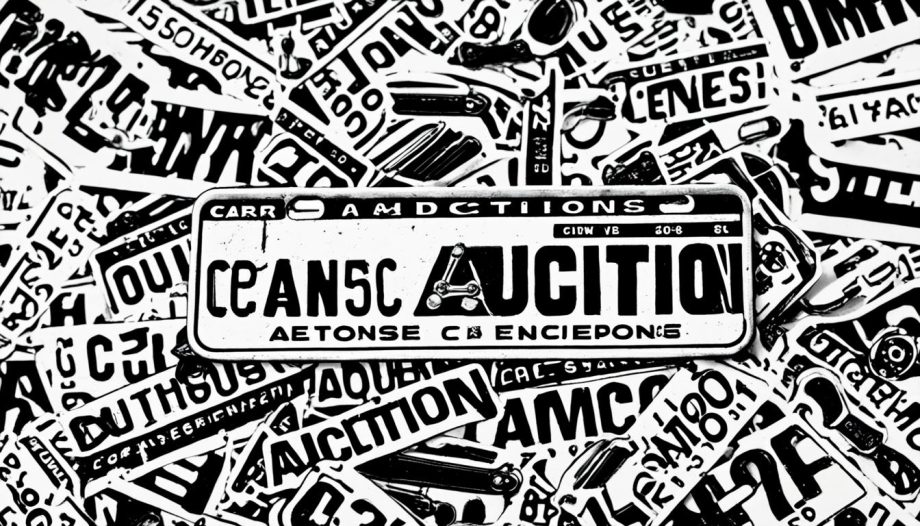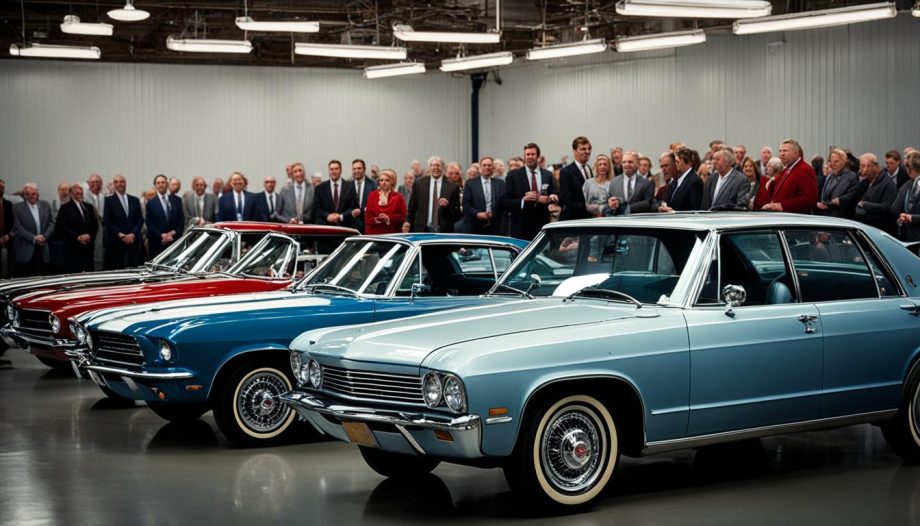Welcome to our comprehensive guide on car auctions! If you are new to the world of car auctions or looking for some insight before attending your first one, you’ve come to the right place. In this section, we will provide you with valuable information on what you can expect when attending a car auction.
Car auctions are exciting events where individuals have the opportunity to purchase vehicles at competitive prices. Whether you’re searching for a budget-friendly car or a rare gem, car auctions can be a treasure trove of options.
Throughout this article, we will cover the car auction process, the types of cars available, and share helpful tips to ensure a successful bidding experience. By the end, you’ll have a better understanding of what awaits you at a car auction and how to navigate the process with confidence.
So, if you’re ready to learn more about car auctions and how they can help you find your dream car or a great deal, let’s dive in!
Understanding the Car Auction Process
When it comes to buying a car, auctions can be a great way to find a wide variety of vehicles at competitive prices. Understanding the car auction process is essential for a successful bidding experience. In this section, we will walk you through the step-by-step journey of a car auction, from registration to payment.
1. Registration
The first step in participating in a car auction is to register as a bidder. This typically involves providing your identification, contact information, and any necessary fees. Each auction house may have specific registration requirements, so it’s important to check their website or contact them directly for details.
2. Preview Period
Before the auction begins, there is usually a preview period where you can inspect the vehicles up for auction. This is a critical step for assessing the condition of the cars you are interested in. Take your time to carefully examine the exterior, interior, and mechanical components. It’s also a good idea to run a vehicle history report to uncover any past accidents or issues.
3. Bidding
When the auction starts, the bidding process begins. Auctions may take place in person, online, or a combination of both. If you are attending an in-person auction, be prepared to raise your hand, nod, or use other gestures to indicate your bid. For online auctions, you will typically place your bids using a bidding platform or website. Set a budget and stick to it to avoid overspending.
4. Payment Methods
Once you win a bid, it’s time to complete the payment process. Auction houses usually have specific payment methods, such as cash, certified checks, or bank transfers. Some auctions may offer financing options, so be sure to inquire about this beforehand. Ensure that you understand the payment deadlines and any additional fees or taxes involved.
5. Post-Auction Procedures
After the payment is complete, you will need to follow the post-auction procedures set by the auction house. This may include obtaining the necessary paperwork, such as the title and registration, and arranging for vehicle transportation if needed. Adhering to these procedures is crucial to ensure a smooth transition of ownership.
By understanding the car auction process, you can approach auctions with confidence, knowing what to expect at each stage. Now that you are familiar with the process, let’s explore the types of cars available at auctions in the next section.
Types of Cars Available at Auction
When it comes to car auctions, there is a wide variety of vehicles available for bidding. Whether you’re a car enthusiast, a bargain hunter, or simply in need of a reliable vehicle, you’ll find options that suit your preferences and budget. Let’s explore some of the types of cars you can expect to encounter at an auction.
1. Used Cars
Used cars are a popular category at car auctions. These vehicles have typically been previously owned and may vary in age, mileage, and condition. It’s important to thoroughly inspect used cars before placing a bid to ensure you’re aware of any issues or necessary repairs.
2. Luxury Cars
Auctions often feature luxury vehicles from top brands such as BMW, Mercedes-Benz, and Audi. These high-end cars are well-maintained and provide an opportunity to own a luxury vehicle at a fraction of its original price.
3. Classic Cars
Classic cars are a favorite among car enthusiasts and collectors. These iconic vehicles exude timeless charm and represent a piece of automotive history. It’s important to research the market value of classic cars before bidding, as their rarity and condition can significantly impact their price.
4. Salvage Cars
Salvage cars are vehicles that have been damaged, either through accidents or natural disasters, and deemed uneconomical to repair by insurance companies. These cars are often available at lower prices, making them a popular choice for those who have the skills and resources to restore and rebuild.
5. Exotic Cars
Exotic cars, such as Lamborghinis, Ferraris, and McLarens, are a highlight at car auctions. These rare and performance-oriented vehicles attract attention from collectors and enthusiasts worldwide. However, it’s important to thoroughly research and understand the costs associated with owning and maintaining exotic cars before bidding.
6. Commercial Vehicles
Car auctions also offer a selection of commercial vehicles including vans, trucks, and SUVs. These vehicles are often used for business purposes and come in various sizes and configurations to meet the needs of different industries.
7. Electric and Hybrid Cars
With the growing demand for environmentally friendly vehicles, auctions now feature electric and hybrid cars. These fuel-efficient cars not only help reduce emissions but also offer potential savings in fuel costs over time.
These are just a few examples of the types of cars you’ll find at a car auction. It’s essential to do your research, set a budget, and carefully inspect the vehicles to make an informed decision when bidding. Understanding the different types of cars available will help you navigate the auction process and increase your chances of finding the perfect vehicle for your needs.
Tips for a Successful Bidding Experience
When participating in a car auction, having a successful bidding experience is crucial. To help you navigate the process confidently, we’ve compiled some valuable tips to maximize your chances of securing the vehicle you desire. By following these suggestions, you’ll be equipped with the knowledge and strategies needed to make informed decisions while bidding.
Set a Budget: Before attending the auction, determine your maximum bidding limit. Consider your finances, including available funds for the initial purchase as well as potential repairs and maintenance costs. Setting a budget will prevent you from overextending yourself and ensure you make financially responsible decisions during the bidding process.
Research Market Values: Take the time to research market values for the specific car make and model you’re interested in. This information will provide you with a realistic understanding of the vehicle’s worth, helping you assess whether the bidding price aligns with its actual value. Thorough research will also enable you to confidently adjust your bidding strategy based on the current market conditions.
Inspect the Cars: Prior to the auction, make sure to thoroughly inspect the cars you’re interested in. Carefully examine the vehicle’s exterior, interior, and mechanical components. Check for any signs of damage, wear and tear, or potential issues that may affect the car’s value or performance. Being well-informed about the condition of the cars will aid in estimating their true worth and guide your bidding decisions accordingly.
Manage Your Expectations: It’s essential to approach the bidding process with realistic expectations. Understand that there may be other bidders interested in the same vehicle, and prices can quickly escalate. Be prepared for the possibility of not winning every bid and consider alternative options. Adopting a patient and level-headed approach will help you avoid overbidding and allow you to focus on securing the best possible deal within your budget.
By implementing these tips, you’ll be well-prepared for a successful bidding experience at the car auction. Remember to stay focused, be strategic, and rely on your pre-planned budget and research to guide your decisions. Now that you’re equipped with these valuable insights, you’re ready to confidently participate in the bidding process and secure the car of your dreams.

Financing and Post-Auction Procedures
When participating in a car auction, understanding the financing options available and knowing the post-auction procedures is crucial. In this section, we will guide you through the necessary steps to secure financing for your car auction purchase and the procedures to follow after winning a bid.
Financing a Car Auction
Financing a car auction allows you to spread the cost of the vehicle over a specified period. Many auction houses offer financing options, including partnerships with financing institutions and in-house financing. It’s essential to inquire about the specific financing options available before the auction to ensure a seamless bidding process.
Here are some financing options typically available at car auctions:
- Dealer Financing: Some auction houses have on-site dealerships that offer financing directly to buyers. This option provides convenience and the ability to secure financing quickly.
- Bank Financing: Buyers can also obtain financing from their preferred banks or credit unions. Pre-approval before the auction can streamline the process.
- Online Lenders: Several online lenders specialize in financing car auction purchases. These lenders often provide quick and hassle-free financing options.
- Personal Loans: Another financing option is to secure a personal loan from a trusted financial institution. This option offers flexibility and allows buyers to use the funds for various purposes.
Before applying for financing, it’s advisable to check your credit score and review any necessary documentation. This preparation will help you determine the loan amount you qualify for and streamline the application process.
Post-Auction Procedures
Once you have successfully won a bid at a car auction, there are several post-auction procedures you need to follow:
- Payment: Promptly make the payment as specified by the auction house. Ensure you understand the accepted payment methods and any additional fees or charges.
- Documentation: Complete the necessary paperwork required for the title transfer. This may include an application for a new title, bill of sale, and any other required documentation.
- Vehicle Pick-Up: Arrange for the transportation of the purchased vehicle. Most auction houses provide pick-up services or can recommend trusted transport providers. Ensure you have the necessary documents to verify your ownership of the vehicle during pick-up.
Following these post-auction procedures will ensure a smooth transition from winning the bid to owning your new vehicle. It’s crucial to carefully review the auction house’s terms and conditions to understand their specific guidelines and deadlines.
| Financing Option | Key Benefits |
|---|---|
| Dealer Financing | Convenience and quick approval process |
| Bank Financing | Potential for competitive interest rates |
| Online Lenders | Quick and hassle-free application process |
| Personal Loans | Flexibility in using funds for various purposes |
Important Considerations for First-Time Bidders
As first-time bidders, it’s natural to feel a combination of excitement and nervousness. However, by considering a few key factors, you can approach the auction with confidence and increase your chances of a successful bidding experience. Here are some important considerations for first-time bidders:
1. Research the Auction Process
Before diving into your first auction, take the time to thoroughly research the process. Understand how the bidding works, learn about the different auction formats, and familiarize yourself with common auction terminology. This knowledge will help you navigate the auction confidently and make informed decisions.
2. Set a Budget
It’s crucial to establish a budget before attending an auction. Determine the maximum amount you are willing to bid on a vehicle and stick to it. Remember to consider additional costs such as buyer’s fees, taxes, and transportation expenses. Setting a budget will prevent you from overspending and ensure a more financially responsible bidding experience.
3. Inspect the Cars
Prior to the auction, carefully inspect the cars you are interested in. Pay attention to the condition, mileage, and any visible damages. Taking the time to assess the vehicles will help you make informed decisions and avoid potential surprises after winning a bid.
4. Know Your Limits
It’s important to be realistic about your bidding limits. Avoid getting caught up in the excitement of the auction and bidding beyond your budget. Bid confidently but know when to step back if the price exceeds your limits. Remember, there will always be more opportunities in the future.
By considering these important factors, first-time bidders can approach the auction process with greater confidence and increase their chances of a successful bidding experience. Take the time to research, set a budget, inspect the cars, and know your limits. With careful preparation, you’ll be well-equipped to navigate the auction and secure the vehicle you desire.
Auction Etiquette and Safety Tips
When attending a car auction, it’s essential to follow proper auction etiquette and prioritize your safety. By observing these guidelines, you can ensure a positive and secure bidding experience for yourself and fellow participants.
First and foremost, always maintain respect for other bidders. Avoid disrupting the auctioneer or interrupting their bidding process. Wait for your turn to bid and refrain from aggressive or confrontational behavior. Remember, creating a harmonious atmosphere contributes to a successful auction for everyone.
Another crucial aspect of auction etiquette is to adhere to the instructions provided by the auctioneer. Pay close attention to their announcements, bidding increments, and any special terms or conditions. By following their guidance, you can navigate the auction process smoothly and avoid misunderstandings.
Additionally, prioritize your personal safety during the event. Be aware of your surroundings and keep your belongings secure. Avoid sharing personal information with unknown individuals and trust your instincts if you feel uncomfortable or unsafe. Remember to follow any safety protocols or measures put in place by the auction organizers to ensure a secure environment.
By practicing proper auction etiquette and prioritizing your safety, you can enhance your bidding experience and make the most of the opportunities available. Remember to respect fellow bidders, follow the auctioneer’s instructions, and prioritize your well-being throughout the event.




